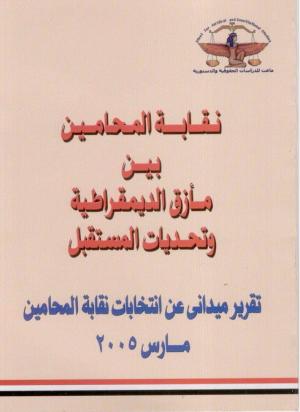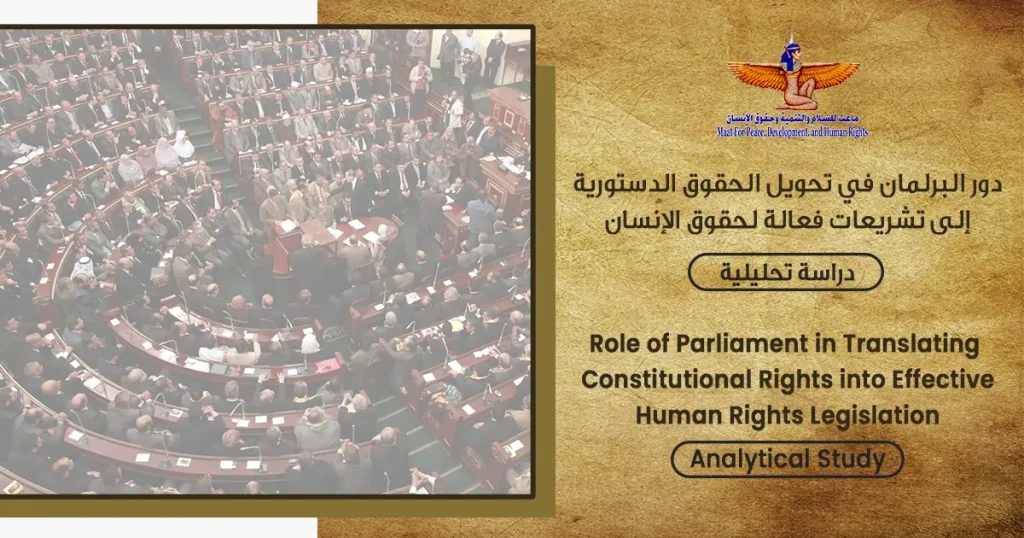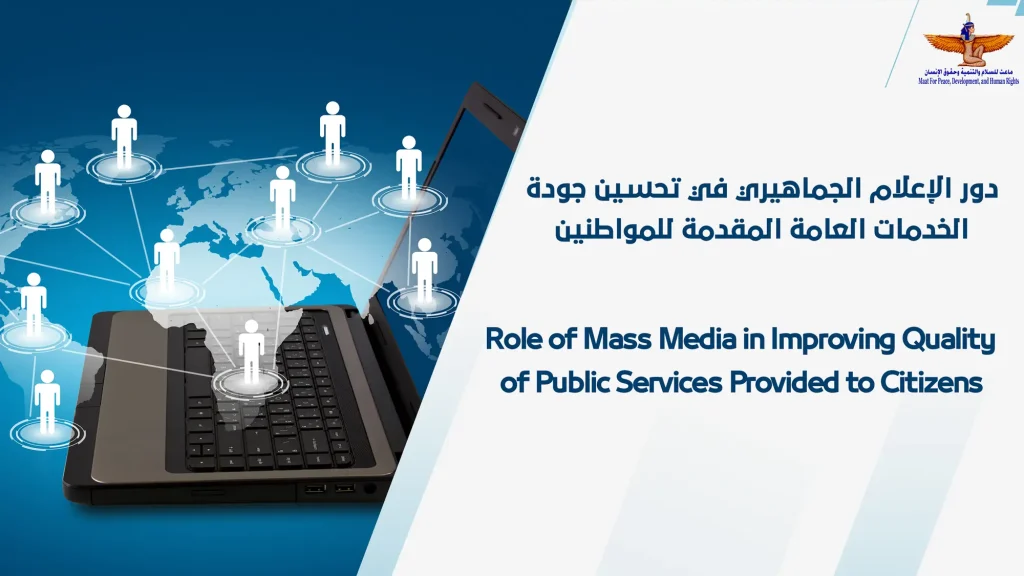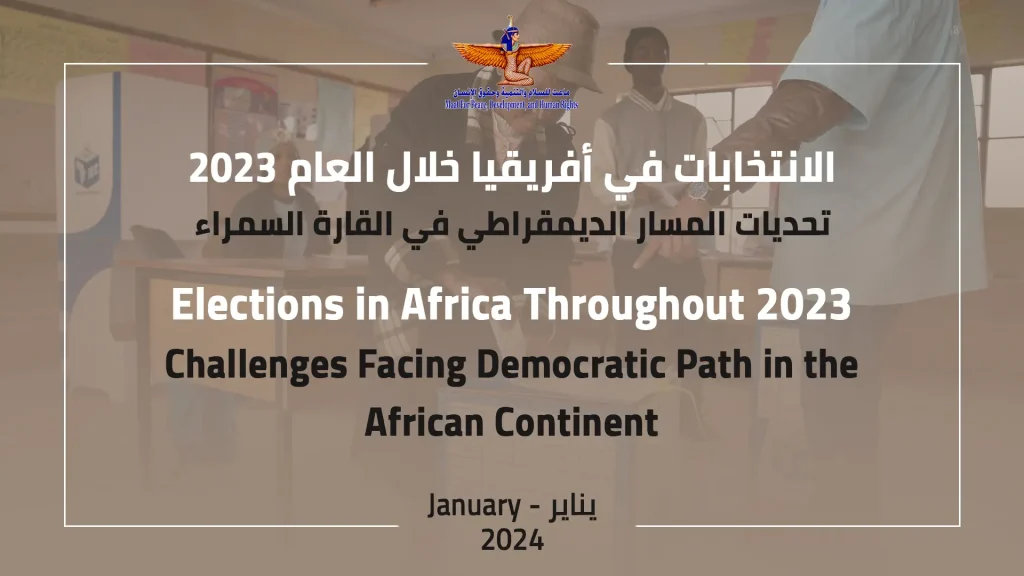Bar
between
The impasse of democracy
And future challenges
Field report on the Bar Association elections, March 2005

Introduction
This report came to monitor the recent elections of the Bar Association, which witnessed the most violent elections the bar has witnessed since its establishment. Hence, the Maat Center for Legal and Constitutional Studies was keen to put in the hands of all those interested in this report, which monitors the various aspects of the electoral process in a serious and honest attempt - as much as possible - and examines the indications and indicators that predict the extent of development in the public work arena in Egypt, the Bar Association It has always been a bastion of freedoms, a castle of justice, and a lofty building that embodies and reflects the patriotic and national feeling in general.
The legal profession is one of the basic pillars in achieving justice, and there is no justice without a judiciary and no judiciary without a legal profession. It has been rightly said that the legal profession is the message of truth, its protector, its voice, and the lawyers are the knights of this message, the bearers of its faithfulness, and those who stand by it, who give sincerity, honesty, light and sincerity in its niches, embrace in their consciences the pain, pains and worries of people go through the thickets and overcome difficulties to carry out their noble mission which is based on argument, statement, proof and freedom.
Lawyership is one of protection, and in countries that practice democracy and the rule of law, people look to the law to protect and promote individual and collective rights, which is stipulated in Article 1 of the Egyptian Lawyers' Law No. 17 of 1983
Lawyer is a free profession that participates in the judiciary in achieving justice, in asserting the rule of law, and in ensuring the defense of the rights and freedoms of citizens. Lawyers are practiced alone in independence, with no authority over them except for their consciences and the rule of law.
In light of this article, the independence of the lawyer is one of the most important elements of the existence and practice of the profession. Independence of the legal profession means that the lawyers perform their role free from any influence or pressure from any party, so the lawyer in performing his mission and an obligation is not subject to anything other than his independent free conscience and from here it was necessary to have a union Strong that protects its children in the face of any violations that they may be exposed to because of their performance of their mission, as well as to work to take care of the interests of lawyers and raise the level of performance and professional practice.
It is worth noting that the first regulation issued in Egypt to regulate the affairs of law was in 1884, and the Egyptian Bar Association was established in 1912 under Law No. 26 of 1912 and since that date, the Bar Association has practiced its professional and national role to the extent that it made the union a mirror that reflects the national and national sentiment, which is what the Syndicate presented Because of the occasional blatant interference by government and security agencies, as a direct result of the national and democratic role that the bar exercised, the elected Bar Council was dissolved three times throughout the history of the Syndicate and until now, the first was in 1954 when the Bar Council issued a statement - after it became clear that the military remained in power - He rejected the military rule and demanded a civilian government, so the Revolutionary Command Council responded on 12/22/1954 by issuing Law No. 709, according to which the Syndicate Council was dissolved and a temporary committee consisting of 17 people was appointed headed by / Abdul Rahman Al-Rafi'i.
The second was when Sadat asked national institutions to support him in what was known at the time as the correction revolution, “the arrest of many symbols of the regime at that time.” After the Syndicate rejected these measures, the Council was dissolved and new elections took place three weeks later, the result of which was the return of most of the members of the previous council and was elected Professor / Mostafa El-Baradei, Head of Lawyers.
Then President Sadat was forced to dissolve the Bar Council in 1981 after strong opposition from the Syndicate to the Camp David agreement. Dr. Jamal Al-Atifi was appointed as the head of the lawyers until the legitimacy was restored by the Constitutional Court ruling to cancel this decision.
From here it becomes clear that the Bar Association is of great value and effectiveness in Egyptian political life, which has made the Bar a focal point of interest from all national and political forces in Egypt. Therefore, the Center was keen to present a field report on the electoral process of the Syndicate that monitors all steps of the elections, from the opening of the door for candidacy to the announcement of the results. And the repercussions of the electoral process in all its forms and forms. The Center was keen to present the professional syndicate crisis in general with Law 100 of 1993 with an indication of the negatives of this law and its impact on the Bar Association, before it goes into field monitoring of the elections.
In the end, we can only thank everyone who helped and contributed to the release of this report.
And there remains a word that we address to the masses of lawyers, their union and the elected council.
Let us all wear the lawyer’s robe and remove everything else, to restore to our union its pioneering role in defending the freedom of the homeland and the rights of the citizen, to restore to the lawyers their place in the heart of the nation, as they are the guardians of truth and messengers of justice, and return to the profession its brightness that is about to disappear.











